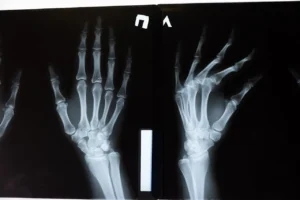
HIGH SCHOOL SCIENTISTS AND ENGINEERS WIN NEARLY $9 MILLION AT THE REGENERON INTERNATIONAL SCIENCE AND ENGINEERING FAIR 2023
Regeneron Pharmaceuticals, Inc. (NASDAQ: REGN) and Society for Science (the Society) announced that Kaitlyn Wang, 17, of San José, CA, won the $75,000 top award in the 2023 Regeneron International Science and Engineering Fair (Regeneron ISEF), the world’s largest global pre-college science and engineering competition, for a project that explored planets that orbit very close around their suns. Other top prizes went to projects in the fields of computational biology, animal sciences and neurobiology.
The top winners were honored during two award ceremonies, the first of which took place on the evening of May 18 and featured Special Award winners. The Grand Awards Ceremony was held on the morning of May 19 and included the announcement of the top prize of $75,000. In total, nearly U.S. $9 million was awarded to the finalists, who were evaluated based on their projects’ creativity, innovation and depth of scientific inquiry. The competition featured over 1,600 young scientists representing 49 states and 64 countries across the world.
Kaitlyn Wang won first place and received the $75,000 George D. Yancopoulos Innovator Award, named in honor of the pioneering drug researcher and Regeneron co-founder, President and Chief Scientific Officer, for finding an efficient way to identify certain exoplanets that orbit very closely around their stars. Previous techniques used to detect these ultra-short-period planets required enormous computational power but were not as effective at identifying these planets. Kaitlyn surmounted that problem by creating a special algorithm that runs on cheap hardware and results in much faster and higher-precision findings. Using her research, she says she found the smallest of these planets ever discovered.
Saathvik Kannan, 17, of Columbia, Missouri, received one of two Regeneron Young Scientist Awards of $50,000 for using biocomputational methods to understand the causes of heightened infectivity in the disease mpox after it reemerged in 2022. Saathvik’s approach, named Bioplex, uses a combination of machine learning and three-dimensional comparative protein modeling to decode structures like those that enable the mpox virus to replicate. This allowed him to identify the mutations in the virus that likely made it more infectious as well as other mutations that could make it resistant to antibiotics. Saathvik believes scientists will also be able to apply Bioplex to future outbreaks of other viruses.
Teepakorn Keawumdee, 17; Pannathorn Siri, 16; and, Poon Trakultangmun, 18, of Bangkok, Thailand, received the second Regeneron Young Scientist Award of $50,000 for developing an innovative incubation chamber that promotes the survival of the green lacewing insect, a natural predator of the mealybug, a harmful pest. In nature, the green lacewing has a low survival rate, but the team’s new system increased the lacewing’s survival rate five-fold. In field tests, their incubation system was an effective alternative to insecticides and lowered the mealybug population density nearly four-fold.
“Congratulations to the Regeneron International Science and Engineering Fair 2023 winners,” said Maya Ajmera, President and CEO, Society for Science and Executive Publisher, Science News. “I am humbled by the creativity and determination demonstrated by these exceptional students and proud of all they have accomplished with their outstanding research abilities. Together, these students from various academic disciplines and geographies are solving the world’s most intractable problems.”
Regeneron ISEF provides a global stage for the best and brightest young scientists and engineers around the world. Through this competition Regeneron and the Society support and invest in the next generation of leading STEM innovators who are generating ideas and acting as catalysts for the change needed to improve the well-being of all people, society and the planet.
“We are thrilled to celebrate this year’s Regeneron ISEF finalists as they join our growing community of bold individuals tackling the world’s most pressing challenges,” said George D. Yancopoulos, M.D., Ph.D., co-founder, President and Chief Scientific Officer of Regeneron. “I applaud today’s finalists and all the ISEF participants for their relentless pursuit of groundbreaking ideas that ignite positive and sustainable change in our world. I owe so much of my passion for science to the experiences and mentors I had in high school, and I hope that today is just the beginning of a lifelong commitment to STEM for many of these students.”
Other top honors from the competition include:
Natasha Kulviwat, 16, of Jericho, New York, received the Gordon E. Moore Award of $50,000 for Positive Outcomes for Future Generations for her search for biomarkers to help prevent suicides. By analyzing de-identified brain tissue from 20 people, Natasha measured levels of two proteins, cytokine and claudin-5, and found that neuroinflammation and claudin-5 were increased in the brains of suicide cases. Her work suggests that high levels of the protein claudin-5 could serve as pre-markers for suicide and that certain anti-inflammatory drugs might decrease claudin-5 levels.
Yuyang Wang, 16, of Shanghai, China, received the Craig R. Barrett Award for Innovation of $10,000 for his development of an inchworm-style stick-climbing robot. This type of robot conventionally has grabbers that allow it to climb over and under obstructions like a caterpillar does, but he added skateboard-like wheels, which allow it to perform better than existing inchworm-style robots when the angle is less than 22°. The hybrid wheel/grabber assembly is novel, and he believes his robot will work well for tasks that are potentially dangerous to humans, such as inspecting damaged high-voltage lines.
Rishabh Ranjan, 17, and Gopalaniruddh Tadinada, 17, of Louisville, Kentucky, received the H. Robert Horvitz Prize for Fundamental Research of $10,000 for building a custom, automated system to detect gastrointestinal cancer before serious symptoms appear. The team’s system combines robotics and machine learning to analyze blood samples to identify healthy patients, as well as those with pancreatic, colorectal or hepatic cancers, in only three hours at an estimated cost of only $300. Detecting these cancers before they metastasize could make treatment much simpler and more effective.
Eugene Chen, 16, of Shanghai, China, received the Peggy Scripps Award for Science Communication of $10,000 for his inexpensive energy-saving device that recycles the condensation produced by air conditioners to improve their energy efficiency. His device directs the cooling fan’s airflow to spray the air conditioner’s condensation at its own condenser, lowering its temperature and thus reducing power consumption and improving its energy efficiency.
Source link:https://www.regeneron.com/




